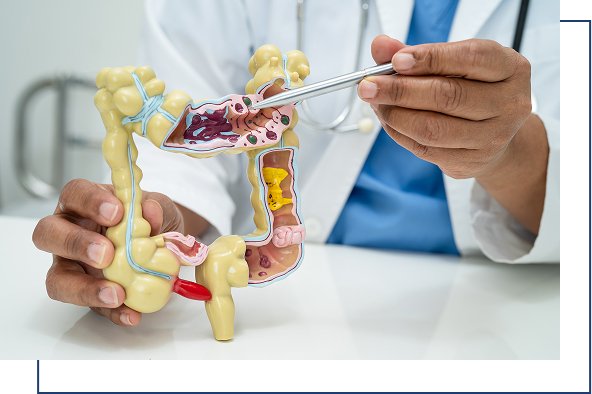Overview
A colonoscopy is a medical procedure used to examine the inner lining of your large intestine (colon and rectum). This vital screening test can spot and remove small abnormal growths before they become harmful. It’s a safe and effective way to screen for colorectal cancer, which is the third leading cancer worldwide.

Purpose
A colonoscopy procedure is primarily used to:
Detect and remove polyps.
Diagnose causes of rectal bleeding or chronic diarrhoea.
Screen for colorectal cancer.
Investigate symptoms of piles or other bowel issues.
How It Works?
The colonoscopy is usually performed on an outpatient basis, meaning you won’t need to stay in the hospital overnight.
The colonoscopy method is safe, minimally invasive, and typically painless. However, discuss any concerns about colonoscopy side effects with Dr. Debjoy Sau.
Preparation
Your doctor will recommend a colonoscopy diet, including clear liquids and laxatives, to cleanse your bowel.
Procedure
During a colonoscopy, the doctor inserts a thin, flexible tube with a camera (colonoscope) into the rectum. This helps examine the entire lining of the colon. You may receive general anaesthesia for comfort. If any polyps are found, they can be removed during the procedure.
After Effects
Mild cramping or bloating may occur post-procedure, but these are temporary. Most individuals resume normal activities within a day.
Book An Appointment
FAQs
Know Your Answers
Is the procedure painful?
No, most patients feel little or no discomfort due to sedation or anaesthesia during the procedure. You might experience mild cramping afterwards.
Is there an age limit for a colonoscopy?
There is no strict age limit for a colonoscopy. However, it’s generally recommended for adults starting at age 45. Visit our colonoscopy test centre in kolkata to determine if you need a colonoscopy.
Can women have a colonoscopy?
Yes, a colonoscopy for females is performed the same way as for males.
Does a colonoscopy require general anaesthesia?
General anaesthesia is not always required for a colonoscopy. You may be given medication to help you relax, but you will still be awake during the procedure.
Can colonoscopy detect haemorrhoids?
Yes, the procedure can effectively identify haemorrhoids and other colon conditions.

